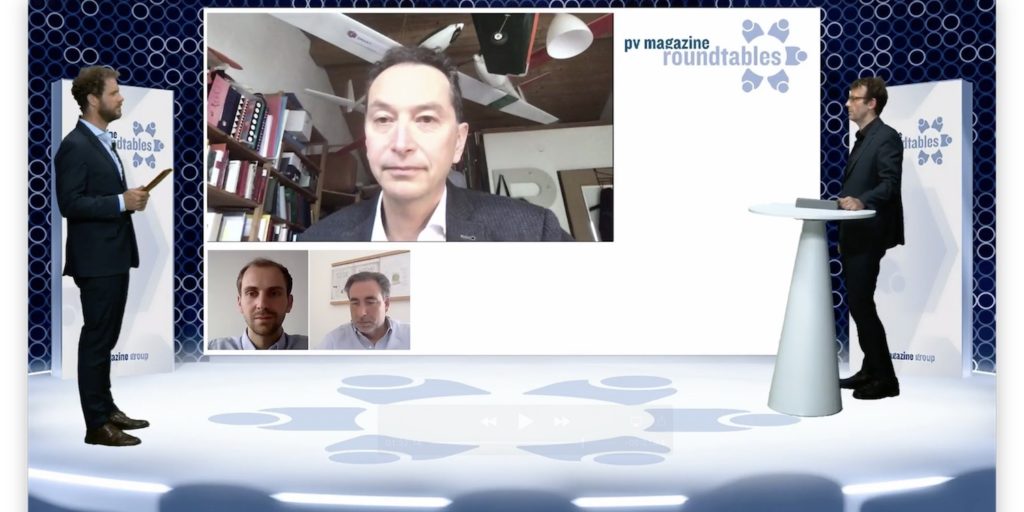An examination of how solar plants financed by power leasing contracts with industrial clients are evolving is particularly timely during the Covid-19 crisis, and was one of the topics for discussion at a recent pv magazine Roundtable Europe event.
Despite the current challenges facing the industry, post-Covid is still pre-climate catastrophe, to paraphrase Bassam Darwisch, head of renewables origination at the energy trading division of Swedish power company Vattenfall.
The outlook for corporate power purchase agreement (PPA)-financed solar plants is uncertain for now and analysts at German company Aurora Energy Research have posited four scenarios.
Forecasts
The most optimistic outlook foresees revenues next year only slightly below those witnessed before the onset of the public health crisis. The most pessimistic model, however, predicts revenues of less than half pre-Covid figures, with returns still down on previous levels even by 2025.
“Uncertainty is the brake on … corporate PPAs,” Mateusz Wronski, head of product development at Aurora, told the roundtable – from minute 17 of the recording. The closing price for corporate PPA solar power in Spain predicted by the Aurora models ranged from €0.26-0.36/kWh.
A subsequent discussion of the points corporate-PPA-backed project developers must consider, and of how small PPA-financed projects could become, was aided by a presentation by Björn Piske of Vattenfall Europe Innovation’s solar plant development division, and by a panel discussion involving Ralf Bernhard, manager of C&I [commercial and industrial] origination and PPAs at German developer BayWa r.e., and Eckhard Doose, who works in the project financing division at compatriot lender Bayerische Landesbank.
Hydrogen
While the corporate PPA segment of the solar market is in flux thanks to Covid-19, the prospects for the use of solar power to produce hydrogen appear undimmed.
Christian Pho Duc, managing director of Smartenergy Projects, analyzed the cost and price options for a solar-powered electrolysis plant in Portugal which is set to start hydrogen production in 2022 – from minute 64 of the recording.
“With CO2 targets set to become stricter in the future, the industry is already asking how much green hydrogen they can have when they can have it,” said Pho Duc. “Projects, in turn, will take several years before green hydrogen comes out.”
Pedro Amaral Jorge, of the Portuguese Renewable Energy Association (APREN), said: “Green hydrogen is a new market to use solar power. It gives the opportunity to sell a product independently of the grid.”
The sector is coming on apace in Germany too, although Karl Hauptmeier, of hydrogen company Sunfire, predicts PPAs, rather than direct energy supply from solar plants, will fire the nation’s electrolyzers. Panelists agreed the economic model which emerges will be dependent on local conditions such as grid access and costs.
“It won’t be a gigawatt market tomorrow but if you don’t pay attention to it now, you will miss it,” said Hauptmeier.
A big thanks to the sponsors of Virtual Roundtables Europe 2020 from pv magazine
Click here, to see links to the event’s sponsors
Presentations:
Those who registered for the event can download the presentations in the networking area of the event app -> to the event app
The videos of all sessions of the pv magazine Virtual Roundtables Europe 2020 event are online:
This content is protected by copyright and may not be reused. If you want to cooperate with us and would like to reuse some of our content, please contact: editors@pv-magazine.com.



By submitting this form you agree to pv magazine using your data for the purposes of publishing your comment.
Your personal data will only be disclosed or otherwise transmitted to third parties for the purposes of spam filtering or if this is necessary for technical maintenance of the website. Any other transfer to third parties will not take place unless this is justified on the basis of applicable data protection regulations or if pv magazine is legally obliged to do so.
You may revoke this consent at any time with effect for the future, in which case your personal data will be deleted immediately. Otherwise, your data will be deleted if pv magazine has processed your request or the purpose of data storage is fulfilled.
Further information on data privacy can be found in our Data Protection Policy.